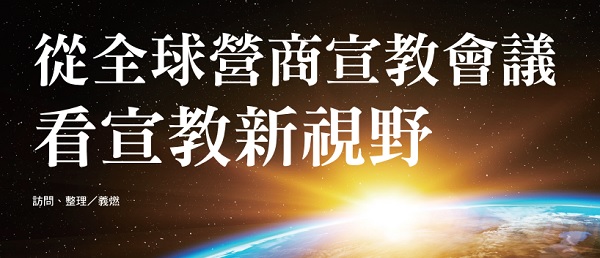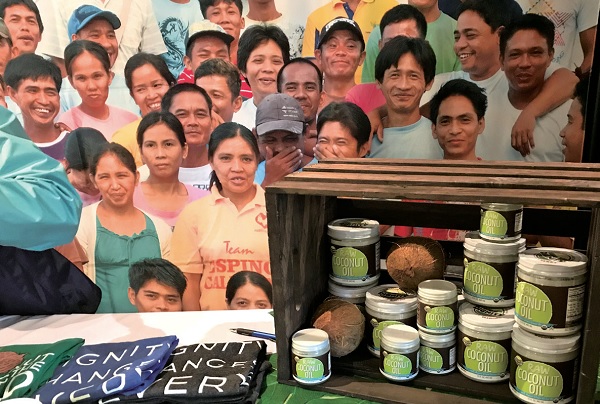A new perspective on missions from the Global Business as Mission Conference
Visit, organize/burn for charity

Editor's note:In late September 2018, more than 400 Christian business people, church leaders and missionaries from all over the world attended the Business as Mission Conference held in Philadelphia, USA. This is the largest and most influential Business on Mission conference in the United States. The conference has been held seven times in the United States. Guests at the conference shared the trends and dynamics of God’s use of business to expand His kingdom around the world, and inspired professionals in various fields to use their God-given skills and talents to spread the gospel to all races and peoples. This magazine interviewed several Chinese representatives who participated in this conference, and let us hear their gains and thoughts.
Huang Mingfa (Convener of Bethel Center)
We hope that business missions will become an important part of Chinese people’s participation in world missions
I was fortunate to hear business as mission professionals from all over the world share their valuable experiences in the past twenty or thirty years at this conference. The moderator of the conference, Mike Baer, mentioned in his opening sharing that although business as mission has a history, it is still a new field and a new journey. So far, everyone is still learning, so there are no real experts. However, through various failures and attempts, and through the accumulation of historical lessons and experiences, it can be seen that the importance of business as mission to future global missions is becoming more and more obvious. Michael also introduced the biblical basis for business as mission in a humorous tone, which left a deep impression on people.
The speakers at the conference are all well-known figures in the field of business as mission. The sharing by Mats Tunehag, senior business mission consultant of the Lausanne Movement, inspired me. He looked at the trends in business mission from a global perspective (Trends in BAM: A global perspective) and pointed out that general business is based on The purpose is to make money, but business as mission is a combination of business and missionary work, achieving social transformation and missionary purposes in the commercial field. In his new book, BAM Global Movement: Business as Mission Concept and Stories, Meitz introduces the global business as mission movement and trends in detail, and also provides reference materials for business mission models that can be used in pioneering regions.
The scope of business mission is very broad. Any activities or research related to economic and social development can become a part of business mission, especially in pioneering areas where Christians are prohibited or restricted from evangelizing as missionaries. For example, they may be engaged in the fields of finance (small loans in mission fields), business (restaurants or coffee missions), education (opening schools, language centers), medical care (services of professionals or clinics, medical equipment), etc. Participation in business as mission often requires sufficient professional qualifications to constitute a path to legal residence. And the business needs are real, not only self-sufficient, but also caring for the country's social development, local employees or residents, in order to produce impactful results.
I also met some familiar friends at this conference, and the one who touched me the most was a young man who participated in Business as Mission. He was my neighbor's child more than 30 years ago, and now he is the owner of a financial management company. In 2017, he opened a restaurant with a friend on the border between an East Asian country and North Korea to participate in business missionary work and spread the gospel to North Korea. I watched him grow up, start a family, believe in the Lord, and participate in church short-term missions. Now he is participating in the Great Commission in a business way, which is really gratifying.
Overall, Chinese churches have not yet invested much or participated in the field of business mission. I believe that in the future wave of global missionary work, God will raise up and use Chinese people to bring the love of Jesus Christ to pioneering areas and spread the gospel to unreached people through trade and work. I am willing to join the ranks of mobilizing and encouraging brothers and sisters to participate in business as mission. I look forward to the cooperation of all parties so that more Christian business people, professionals and missionaries can witness through life and life in unreached lands. , influence the local people they come into contact with, establish churches, and transform cities and countries.
It is urgent for the Chinese church to learn in the field of business missionary work. Pray that God will raise up Chinese churches everywhere to become churches that send, promote and support business mission. Participate in the Great Commission through various means such as prayer, financial support, sending missionaries and short-term mission teams, and caring for business missionaries. We hope that business missions will become an important part of the Chinese people’s participation in the worldwide missionary movement, and that all nations and peoples will come to return to the unique and true God.
Paul Lee (deacon of a Chinese church in Philadelphia)
Let business be a steady stream of God’s grace to the unreached people
What touched me most deeply at the Business as mission conference was the inspiration and reflection on the Business as mission model from biblical stories: God’s grace to us is endless and will never dry up. As described in 2 Kings 4:1-7: Elisha asked the woman and her children to bring as many of the neighbor’s jars as they could, and finally filled them all with oil. Afterwards, they were asked to sell oil to pay off their debts, and the rest was enough for their living. Here, God tells us to use local resources (neighbor’s earthen jars) and put in our own hard work (take the initiative to borrow), and God will meet our needs in life. Creating job opportunities through business models, improving the lives of people in economically backward countries and regions, and then bringing the gospel to them, isn’t it God’s continuous and never-ending grace?

▲The Bible story in 2 Kings Chapter 4:1-7 inspires us: God’s grace is endless and never runs out. We have to use local resources (neighbors’ clay pots) and work hard (take the initiative to borrow), and God will allow us to create jobs through business models, improve the lives of people in backward areas, and then bring the gospel to them.
At the conference, I saw that many brothers and sisters and Christian organizations have actively started the practice of business as mission. For example, "HCR Coffee Roasting" (pseudonym) organized local people to process and make coffee in northern Thailand; and "DC Coconut" (pseudonym). At first, missionaries only went to remote mountainous areas to help poor people there. Later, they found that they could use local Coconuts extract oils for consumers to eat or use for beauty. Since then, the local people have had many job opportunities and increased their income. At the same time, they have also brought the gospel of Jesus Christ there.
The practice of business as mission requires a lot of preparation, including prayers from brothers and sisters, discovering the needs of local people, understanding local resources (including human and natural resources), familiarity with local laws, etc. It is best to hire a business as mission consulting agency for planning, evaluation and training. Many financial institutions can also provide corresponding loans for business missionary work.
Business as mission is of great significance for the Chinese church to participate in the Great Commission. We can effectively combine preaching the gospel with concrete help to the local people, so that they can feel that the gospel is not only the eternal truth of the kingdom of heaven, but can also help their daily lives and make them realize that the grace of the Lord Jesus is endless. of.
The Chinese church needs to expand its horizons and update its concepts in the field of business missionary work. Too often, we are afraid and unwilling to talk about material needs in church or on the mission field, thinking they are worldly. The dichotomy between sacred and secular causes us to focus only on serving within the four walls of the church, resulting in a lack of witness and influence in other areas of society. When missionaries and Christian businessmen improve the lives of local residents through business models, and when people learn to create value for society through their own labor, the effects of the gospel are revealed through social transformation. We believe that the business as mission model will be a very important missionary strategy in many untapped areas.

▲In 2018, Business as mission company products were on display at the Business as mission conference in Philadelphia, USA. (Photo courtesy of Paul Lee)
Wu Limin (Media Outreach Volunteer at Bethel Center)
Spread love to the ends of the earth through coffee
In 2013, I had the opportunity to be exposed to atypical missionary methods outside the church. Later, I met brothers from South America, who exposed me to the concept of "coffee missionary work." When I returned to Taiwan in 2017, I had the opportunity to visit Aroma Cafe with my children and heard the staff tell the story of the pastor and coffee shop owner who went to Taiwan to pioneer missionary work in 2008. At first, they directly planted churches, but the results were not great. Later, they opened coffee shops to attract young people and established coffee house churches.
In June 2018, during a missionary trip to Kyrgyzstan, Lebanon, Jordan and other countries, God continued to miraculously bring us resources to participate in "coffee missions". I had the opportunity to meet seven or eight coffee pastors, more than 20 of them. Christian coffee merchants and hundreds of missionaries also heard stories of cafes built next to mosques.
In September, at the coffee mission workshop of the Global Business as Mission Conference, I met one of the promoters of coffee mission, scholar Dave Price. The international coffee cooperative he founded currently has more than 384 members. Facebook members interested in coffee evangelism. During the discussion at the workshop, I saw that coffee is really a big missionary platform, allowing professionals in different fields and all aspects of the industry chain to participate in missionary education through coffee. This is consistent with the information collection and evaluation results that the Bethel Center has invested energy, time and money in over the past year or two.
Many people don’t know where the coffee they drink every day comes from? How many people's blood, tears and unfair treatment are involved in the "superior coffee" we enjoy in high-end cafes? A cup of coffee costs NT$30 to NT$100. Coffee is not just coffee, there are many things to say. In response to the "call to do justice" initiated by KRC founder Teacher Gao Lili, we changed the name of the coffee event to the "Coffee for Doing Justice" series of activities, hoping to spread love to the ends of the earth through coffee.
Currently, we are planning to establish the "Farm2Cup Coffee Alliance". The future vision is to gather Christian businessmen and coffee professionals who are aiming at coffee missionary work, from coffee farmers to cafes, to create missionaries in the area and those with physical and mental disabilities. Provide employment opportunities for disadvantaged groups; assist coffee farmers to improve the production process and improve quality, reduce intermediate links and exploitation, and return reasonable profits to coffee farmers and for educational purposes.
The operation model of Coffee Mission is very simple, everyone can participate, and all donations are to help disadvantaged groups and promote related ministries. With just a few bags of ear-hook coffee and a simple coffee pot, you can become a coffee missionary and participate in this dream. If you have money, you can contribute, and you can contribute. While tasting healthy coffee, you can also listen to touching coffee stories, because this is His Story. Missions can start with a cup of coffee.
Participating in this business as mission conference allowed me to learn about the global network connecting coffee and missions. Seeing that so many Christian businessmen and missionaries have participated in it made me very happy and excited, and I am full of enthusiasm for future ministries. Faith and hope. I look forward to learning and understanding more about the importance of business as mission together with my brothers and sisters. I also look forward to ordinary people like us being able to become vessels in God’s hands, giving full play to our talents, and participating in the Great Commission.
Recommended reading
Professional websites, seminars and training courses on business as mission:
‧http://www.chinesebam.com/Business as mission Chinese comprehensive resource library, providing BAM traditional and simplified Chinese literature, think tank reports and cases;
‧http://bamglobal.org/ provides BAM global think tank reports, aiming to promote the global business as mission movement;
‧http://businessasmission.com/ Business as mission resources, blogs and ministry reviews;
‧http://bamtraining.org/Business as mission training, including business discipleship training courses;
‧https://www.openusa.net/ Transforming the country through business, inspiring and mobilizing the next generation to participate in business transformation.
Books in Chinese and English about business as mission:
1. Tentmaking: The Life and Work of Business as Missions, by Patrick Lai
2. "4P Enterprise", author: Guan Bao
3. BAM Global Movement: Business as Mission Concept and Stories. Gort, Gea and Tunehag, Mats.
4. Business for Transformation: Getting Started. Lai, Patrick。中文版《營商轉化—入門篇》將於2019年在香港出版
5. The Missional Entrepreneur: Principles and Practices for Business as Mission. Russell, Mark L.
6. Business As Mission – The remarkable power of business in the kingdom of God, Baer, Michael R.
7. "Corporate Mission", author: Michael Bell
8. "Great commission companies: the emerging role of business in missions" (Great commission companies: the emerging role of business in missions), author: Steve. Steve Rundle, Tom. Tom A. Steffen
Yiran, from China, living in the United States, currently serving in the Chuangqi area, and actively promoting cross-cultural missions through writing.
